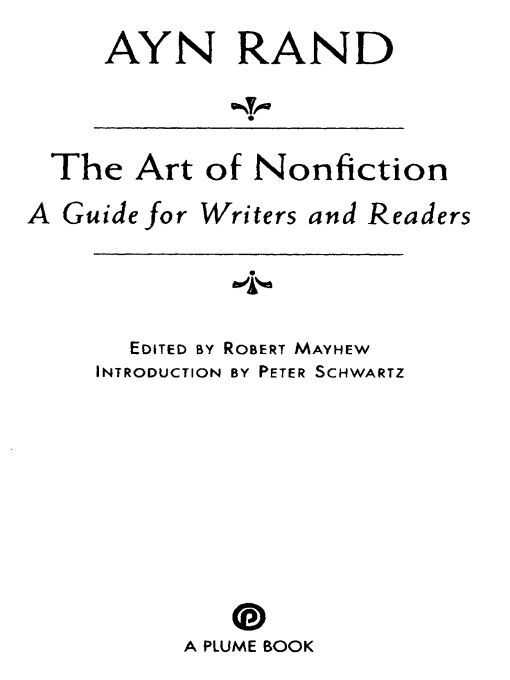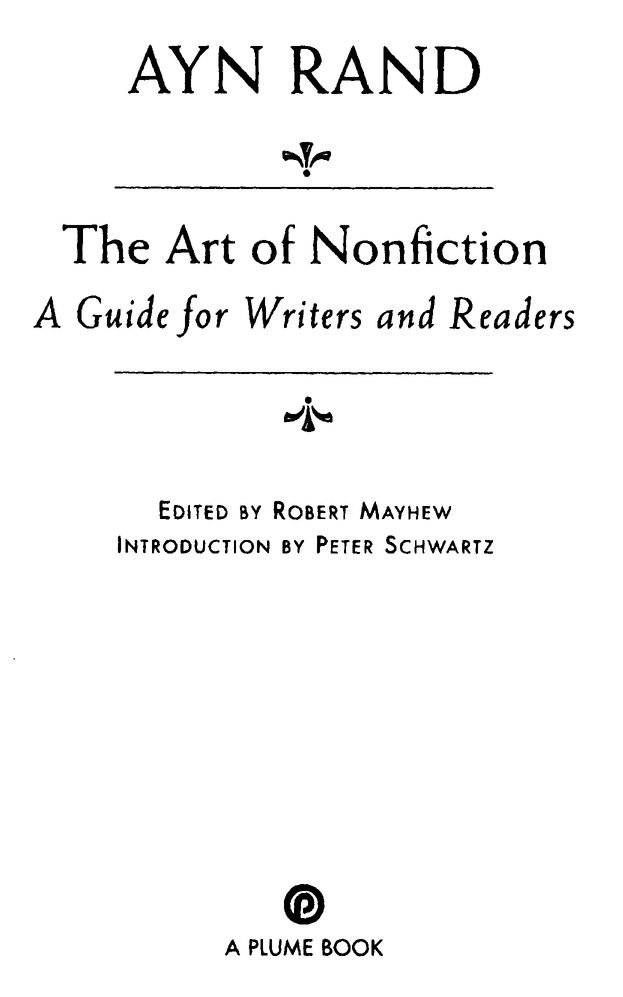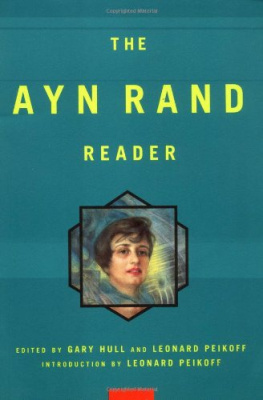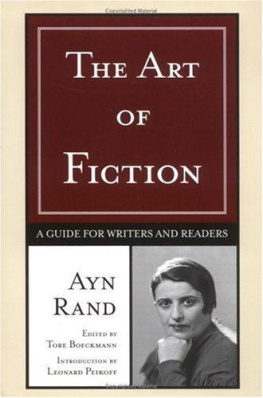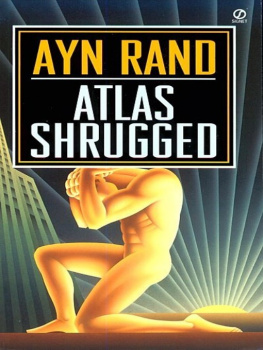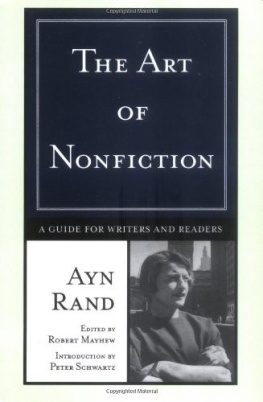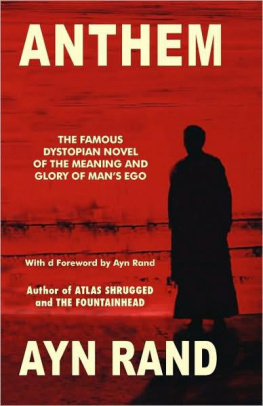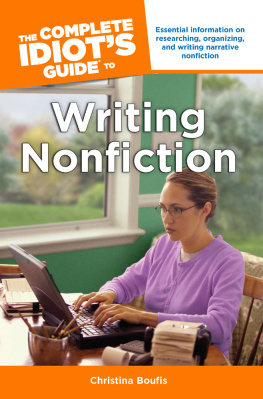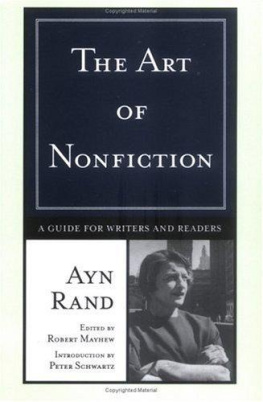Table of Contents
AYN RAND is the author of Atlas Shrugged, philosophically the most challenging bestseller of its time. Her first novel, We the Living, was published in 1936, followed by Anthem. With the publication of The Fountainhead, she achieved a spectacular and enduring success. Rands unique philosophy, Objectivism, has gained a worldwide audience. The fundamentals of her philosophy are set forth in such books as Introduction to Objectivist Epistemology, The Virtue of Selfishness, Capitalism: The Unknown Ideal, and The Romantic Manifesto. Journals of Ayn Rand, The Ayn Rand Reader, and The Art of Fiction are available in Plume editions. Ayn Rand died in 1982.
ROBERT MAYHEW, Ph.D. is an associate professor of Philosophy at Seton Hall University. He is the editor of Ayn Rands Marginalia and has lectured extensively on Rand.
PETER SCHWARTZ is chairman of the board of directors of the Ayn Rand Institute, as well as an instructor of an advanced writing course at the Institutes Objectivist Graduate Center.
INTRODUCTION
To all the practitionersand to all the discouraged, might-have- been practitionersof the art of nonfiction writing, the author of this book offers an invaluable service: she de-mysticizes writing.
The process of writing is widely regarded as an impenetrable mystery. Good writing, it is believed, is the product of some inborn ability, which can be neither objectively defined nor systematically learned. Like ardent religionists who insist that the road to truth is open only to those who are visited by divine revelation, many teachers of writing claim that the path to effective prose can be traversed only if one is struck by the inexplicable thunderbolt of inspiration.
Ayn Rand rejects this idea. She maintains that writing is a rational sphere, governed by rationally identifiable principles.
Writing is no more difficult a skill than any other, such as engineering, she says. Like every human activity, it requires practice and knowledge. But there is nothing mystical to it. Since writing is essentially the act of communicating your thoughts clearly, it can be done competently by virtually everyone: Any person who can speak English grammatically can learn to write nonfiction.... What you need for nonfiction writing is what you need for life in general: an orderly method of thinking.
In analyzing the process of writing, her starting pointunlike that of other theoristsis not the content of the writers mind, but the source of such content: the facts of reality. On this philosophic issue, Ayn Rand was an unyielding advocate of the Aristotelian view, which she described as the primacy of existencethe view that the universe exists independent of anyones awareness of it, that the function of consciousness is to grasp, not to create, reality, and that the absolutism of existence is what ought to shape ones thoughts (and actions).
This is the premise that underlies her approach to writing. Repudiating the standard, subjectivist perspective, she holds that writing is to be treated as an objective science: Whenever you have a problem, whether you are writing an article or building a doghouse, do not look inside for the solution. Do not ask: How do I do it? Why dont I know it? Look outside and ask: What is the nature of the thing I want to do? From this, she proceeds to discuss the nature of writing and its consequent requirements, such as the strict need to delimit ones subject and theme, or the indispensability of an outline. She provides clear, perceptive principles about the psychological process of writing (such as the different roles played by the conscious mind and the subconscious), along with methodical advice to guide you through the process (from getting ideas, to choosing your subject and theme, to polishing your draft).
The primacy of extrospection over introspection leads to another important principle of writing. Ayn Rand urges writers to direct their attention solely to their workto what is needed to do it well, to how to solve problems that arisebut not to its supposed meaning for ones worth as a person: If you have difficulty with writing, do not conclude that there is something wrong with you. Writing should never be a test of self-esteem.
Of course, according to the mystical viewpoint, the writers self-esteem will always be at issue. If writing is a matter of being zapped with inspiration by a gracious muse, the absence of such inspiration must indicate unworthiness on the writers part.
One of the worst consequences of that viewpoint is the mental torture it inflicts upon writers. If the content of your consciousness arises causelessly, independent of reality, then writing is a journey not into the unknown, but into the unknowable. If there are no firm rules by which to proceedif one must stare passively at an empty page or empty screen, with mind idling, waiting desperately for the muse to hit the acceleratorthen writing must be laden with anxiety and guilt. It is tantamount to trying to design a computer with no principles of electronics or mechanics, only the hope of somehow being moved by the right spirit.
Since writing should be regarded as a science, Ayn Rand says, the job of the writer is at root no different from that of the scientist. It would never occur to a scientist to focus partly on his experiment and partly on his self-esteem or future fame. (If it does, he is a neurotic and will probably not be heard from.) He has to focus exclusively on his experiment. Nothing else is relevant. The same applies to writing, only it is harder because it is a purely mental jobthere is nothing in reality yet except a blank sheet of paper. This is why so many people fail at it. It is harder to focus on the reality of what you have to produce when there is nothing before you but a blank page.... In practice, you must be more reality-oriented than a scientist, who has the help of the physical problem and the physical objects he is working with.
This is not just the de-mysticizing, but the de-agonizing of writing. Ayn Rands methodology will not make writing problem-free, but something much better: problem-solvable. The conviction that ones work can be guided by rational principles rescues writers from a sense of helplessness. It saves them from the state of pre-science savages, who felt they were at the mercy of incomprehensible forces. Such a feeling is paralyzing to a writer, who has to know that, in principle, he is in control of his workthat his success depends, not on some inscrutable emanations from his gut, but on identifiable ideas from his brain.
Those who are serious about writing should find this approach enormously rewarding. I know that after reading an early transcript of this material years ago, I found the process of writing much easier and more enjoyable. The approach presented in this book makes writing a definableand thus readily doableactivity, rather than a debilitating battle. I use much of this material in a writing class I teach at the Objectivist Graduate Center of the Ayn Rand Institute. And the response I typically get from students is something along the lines of: So there is a definite method by which to writeand it works!
The transcript I originally saw was merely a verbatim account of Ayn Rands extemporaneous remarks. In this book, by contrast, her presentation has been impressively reorganized, with material taken painstakingly from one comer of the transcript and moved to another, where it logically belongs. Robert Mayhew deserves abundant praise for his editing, which has resulted in a much more integrated and readable product.

